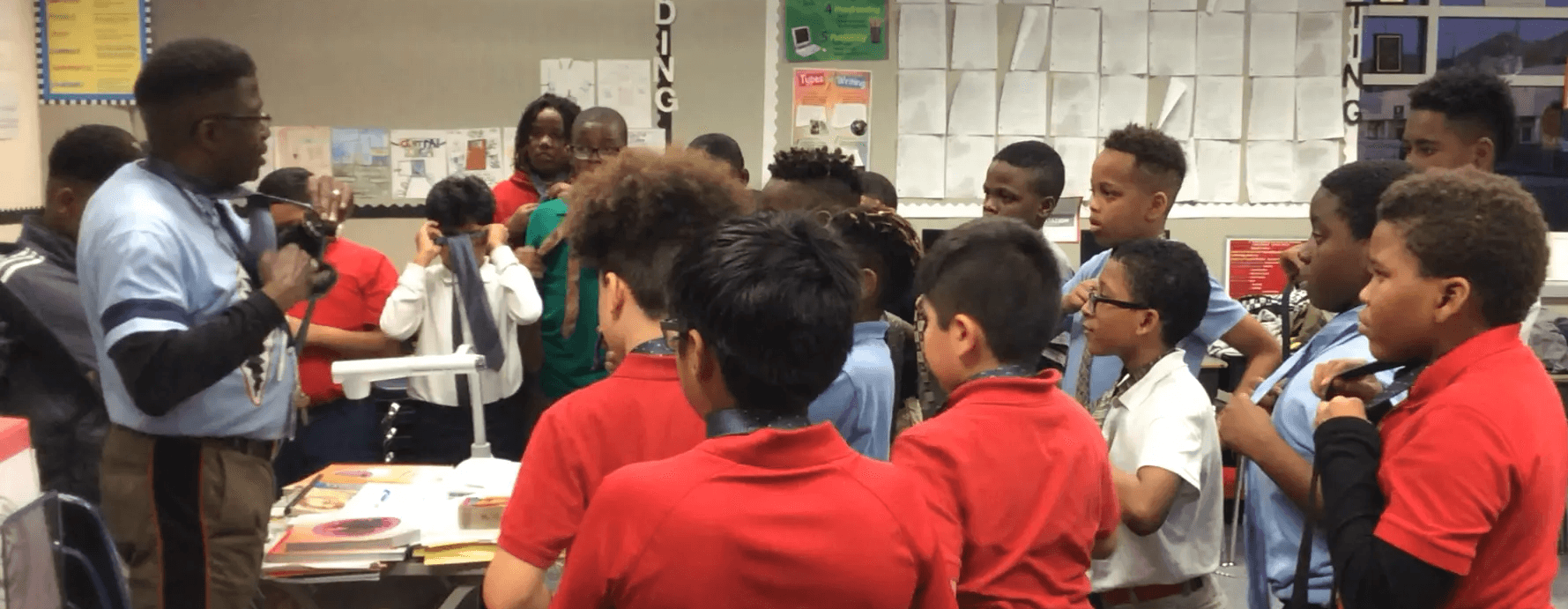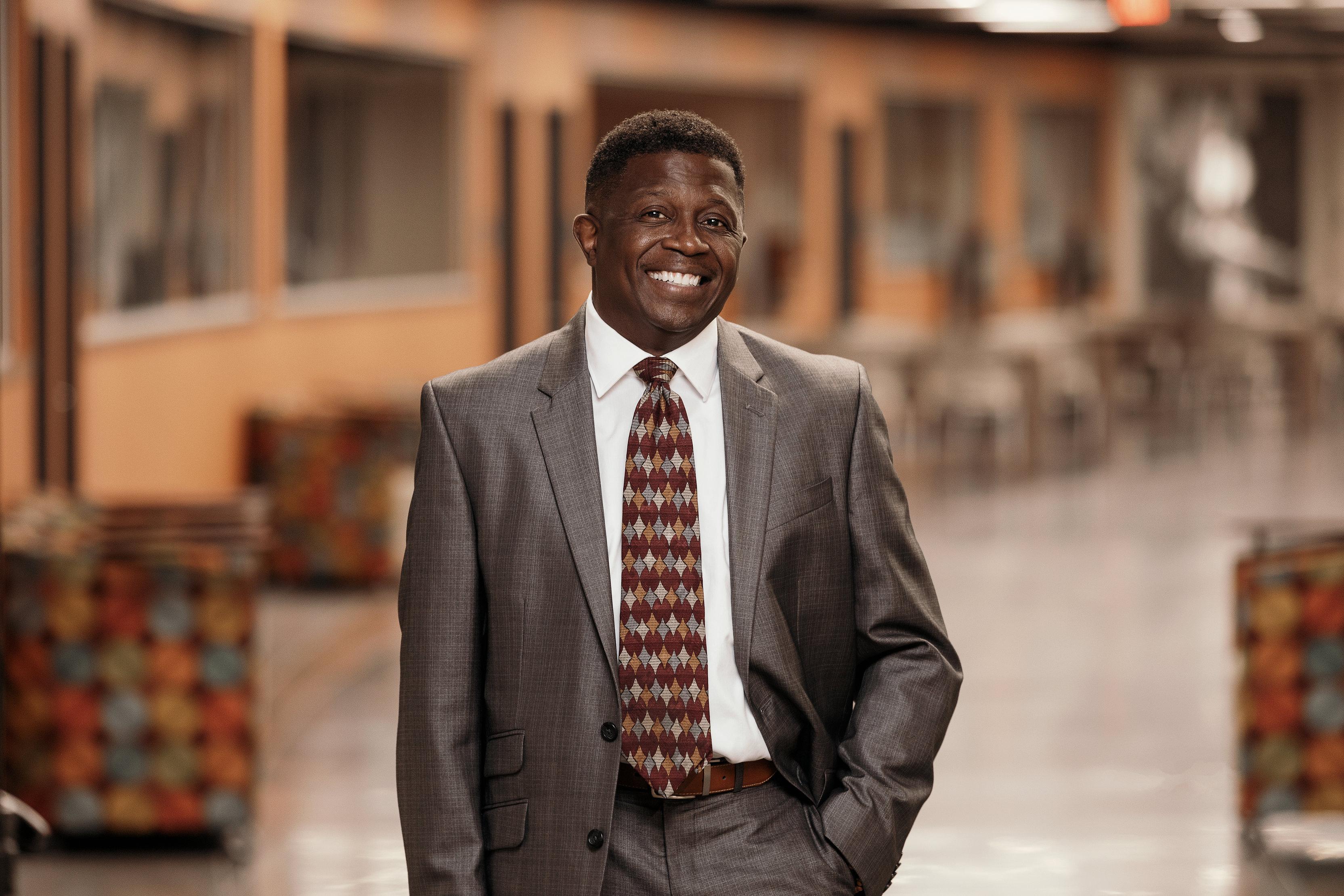
When a career change becomes a mission
In the middle of a successful advertising career, Robin Toy began thinking about his legacy. Seeing the crucial need for Black male educators, he decided to “stop talking about it and be about it.”

In the middle of a successful advertising career, Robin Toy began thinking about his legacy. Seeing the crucial need for Black male educators, he decided to “stop talking about it and be about it.”
You could call it a career change, or you might call it divine intervention. Call it what you will, but after 20 years in advertising and corporate communications, Robin Toy found himself looking for something more.
But more than what? He had a successful and financially rewarding career working as an account director and media buyer for big names in finance, like Wells Fargo and Bank of America. There were tons of perks, he met famous people, and he made good money. What more could he want? But no matter the tangible benefits, he was missing something intangible.
I was looking for something fulfilling—looking to find my fundamental purpose of existence. I wanted something that would give me sustained spiritual growth for the rest of my life and leave a legacy.

It was during this time that he thought about some of the Black male role models who had influenced him throughout his life—and he saw a common thread. Three of those key figures were teachers. He decided to give it a try. He began subbing in Alief ISD and was able to experience all the school levels and find where he would have the greatest impact while deciding if teaching is what he wanted to do.
The verdict? He loved it. He’s been an elementary ELA and gifted & talented teacher for eight years. He says, “I feel like I’m impacting the world, and I’m so humbled and grateful.”
I come to work every day joyful, happy, excited. I look forward to every day. I really do. There are challenges, but I welcome them. I am blessed.
As a child, Robin excelled at school. He was naturally curious—a scholar from the beginning. He was even offered a chance to skip a grade, though his mom decided against it. He went to Tampa Bay Tech in Tampa, Florida, a vocational high school where he earned a bookkeeping certification, which allowed him to segway to an accounting bachelor’s degree program at Bethune–Cookman University, a private historically black university in Daytona Beach, Florida.
As a natural academic, school was easy for Robin, and he had really fantastic teachers. But throughout his K-12 schooling, only two of those teachers were Black males. Self-efficacy is important—but so is mentorship and guidance. What happens when you look around at the adults in the room, and none of them look like you?
I didn’t even know that African American males could become teachers.
It wasn’t until he landed in Mr Ashe’s fifth grade class that he met his first Black, male teacher. He says “Mr. Ashe was full of dignity and pride and self respect. I could look up to him and see myself in him.” Robin had to wait another seven years to meet a second teacher who looked like him. “Band director William Campbell was a strong African American male. In my senior year, he helped mentor me—and gave me a good path to follow.” While working during the summer in preparation for college, he met Dr. Tennyson J. Wright, a professor of rehabilitation counseling at the University of South Florida.
Dr. Tennyson J. Wright was the first Black male with a doctorate I had ever met. I didn’t know Black males could attain that level of academic and professional success. He looked out for me, and I made him my mentor!
Media and popular culture showed a similar lack of representation. “Newscaster Bryant Gumbel was the only person on a national platform who looked like me. We need men of color so that young boys of color can see themselves—can know what’s possible.”
After college, Robin visited Houston and fell in love with the city. But he didn’t find a job right away.
I had no money, so I called home for help and my mom said “come back home or go to work.” She wouldn't send money, and I wouldn't go home. So, I had to make it work.
He answered an ad for an advertising sales position with the Houston Post. Within a year, he was recruited to the Bernard Hodes Advertising agency. Soon after that, he became the first employee at Gilbreath Communications, Inc., a startup that went on to become a multimillion dollar African American owned ad agency. Throughout his career in advertising, Robin thought of those men who had contributed to his success and showed him what was possible. He wanted to be that mentor for others.
According to Robin, male teachers of color provide a classroom experience that many students may never have had in their lives.
It’s rewarding to all students. They appreciate the diversity, because in today’s classroom, students from around the world sit next to each other in the same classroom and at the same table—and yet that’s not the experience they have of the teachers.
When a male of color is the leader, says Robin, that gives you pride if you're part of the culture and better understanding if you’re not. It’s a win-win for everybody. But it is especially important for young boys of color.
When you don’t see yourself in positions of leadership, it makes things very challenging. Our leadership helps boys see themselves in the future. This is how you carry yourself. This is how you treat yourself. This is how you just be.
“Our young Black boys want to see their uncles, their fathers and their grandfathers shaping their lives. And they love having that in the classroom. They want to know what you’re teaching and how you’re teaching it.”
Robin’s mentorship does not stop with the classroom. In 2015, he founded the Junior Gents, a group of 5th and 6th grade boys from across Alief ISD who meet with Robin and his co-mentors to develop academic and social skills.
“We've got boys from the gifted and talented program, those who are on the Autism spectrum, and some in behavior programs who don’t quite have the cornerstones in place. We mentor an eclectic mix of young men who only want to be better, but who may not have the model to follow to make the transition from boy to young man.”
The mission of the Junior Gents is: “To improve the academic achievement, self-esteem, respect for others, social competence, and avoidance of problems/high-risk behavior to 5th and 6th grade young men by providing a mentoring relationship with a concerned adult who works to help them realize their maximum potential.”
Robin describes this work with great pride: “Though the Junior Gents, I’ve helped change the lives of over 250 young men. Now many of them are college educated young men. They’ve gone on to Morehouse College, The University of Kentucky School of Law, The University of Oregon, Texas College, and more. I mentor them about everything from academics and behavior, to hygiene, wellness and mental health. We bring in guest speakers who are experts in a variety of areas that impact their lives.”
They want to know what it means to be a man. As a result, along with my co-mentors, Joseph Jackson and Damien Wiley, we pioneered that path for them to follow.
The group’s motto is “Building Young Men of Tomorrow, Today”—you could call this Robin’s professional motto too.
When asked about how current teachers and future educators can find support networks of their own, Robin points first to self and then to the larger community.
It starts with self care and self respect. We are not machines. We’re human beings. To maintain your career, you need health and wellness to maintain energy.
Self care for Robin means continuing to grow and learn. “I have a desire to acquire knowledge. I never want to be staid or stagnant.” He also reminds teachers to ask for help. “You need to not be afraid of administrators. They are your allies. They have a full toolbox to help you be successful.”
Other than that, most cities have teacher unions, school board meetings, associations like the Houston Area Association of Black School Educators, free seminars at colleges and community colleges and so many more opportunities. “It’s all just a Google search away, and it costs nothing but effort.”
Robin starts with the basics here.
You must have a passion for kids.They are intuitive and smart, and they know who cares for them. Then you must have a passion for learning. It’s a life-long process, and you have to be open to change. Your kids will teach you as much as you teach them. Teaching is a sharing of information.
Beyond these fundamentals, Robin recently created a professional development curriculum and presented it at Baylor University to a group of first year teachers. It’s called “Sink or Swim: The Four C's of Successful First Year Teaching."
To grow as a teacher, he advises new educators to practice:
Ultimately, Robin says great teachers open up the world for their students and expose them to the possible.
We cannot hold children accountable to things they have never even been exposed to. We’ve got to teach them. With our presence we can be the change that we desire. So stop talking about it. Be about it.